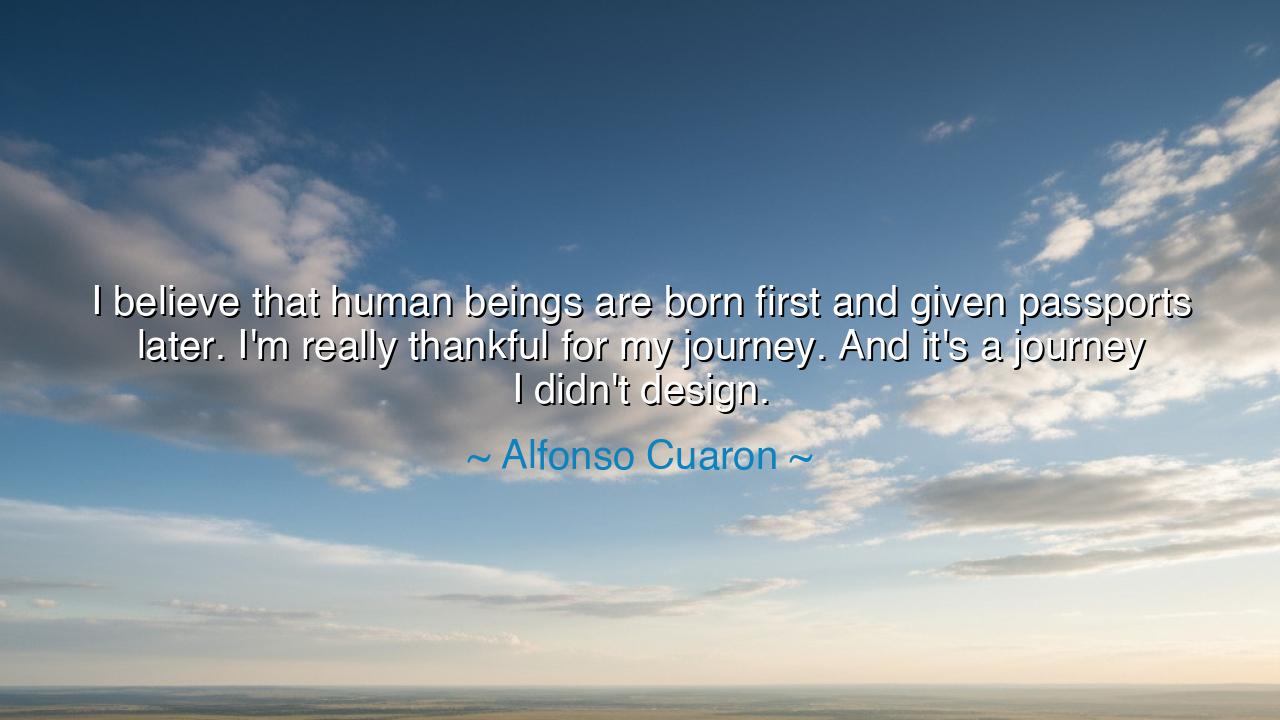
I believe that human beings are born first and given passports
I believe that human beings are born first and given passports later. I'm really thankful for my journey. And it's a journey I didn't design.






"I believe that human beings are born first and given passports later. I'm really thankful for my journey. And it's a journey I didn't design." – Alfonso Cuarón
In these contemplative words, Alfonso Cuarón, the visionary filmmaker, reflects on the profound journey of life, one that transcends borders, plans, and human designs. He reminds us that existence precedes the constraints of identity, nationality, or circumstance; we are born as human beings first, and only later are the labels, rules, and “passports” assigned to us by society. This insight speaks to the primacy of humanity over artificial divisions, urging us to recognize that our fundamental essence is shared, even before the maps, laws, and labels shape our lives.
The origin of this quote lies in Cuarón’s own life and career. Born in Mexico City, he traversed continents to work in Europe, the United States, and beyond, creating films that resonate across cultures. His reflections on the journey of life, which he describes as something he “didn’t design,” capture the unpredictability of existence — the way opportunities, challenges, and experiences unfold without our control. Cuarón’s gratitude for this journey underscores a deep acceptance of life’s serendipity, reminding us that the paths we travel are often gifts, not constructions of our own making.
This insight resonates with the wisdom of the ancients, who recognized life as a journey shaped by forces beyond human mastery. Heraclitus taught that change is constant, that one cannot step into the same river twice. Cuarón’s observation echoes this: we may strive to plan, to define borders, to control outcomes, yet life moves with its own currents. Gratitude for the journey, he suggests, is the path to fulfillment — a recognition that what is given to us, even unexpectedly, is part of the unfolding of destiny.
Consider the story of Alexander von Humboldt, the explorer who traversed continents, documenting the natural world with wonder and insight. Though he could not control the landscapes, climates, or cultures he encountered, Humboldt embraced the journey with curiosity and respect. Like Cuarón, he recognized that the richness of life lies in the experiences we do not design, and in the discoveries made possible by openness to the world. The journey itself becomes the teacher, shaping wisdom and perspective in ways no plan could anticipate.
Cuarón’s words also highlight the tension between agency and surrender. While human beings are capable of immense creativity and planning, life frequently presents circumstances that are beyond our design. To acknowledge this is not resignation but awareness, a recognition that gratitude and engagement with the journey itself are more meaningful than rigid control. The “passports” assigned to us — whether literal, social, or symbolic — are secondary to the fundamental human experience, and it is our capacity to embrace the journey that defines us.
Moreover, this reflection carries a universal message about identity and belonging. Borders and documents may divide, but humanity unites. By asserting that we are born first and given passports later, Cuarón emphasizes the primacy of shared human essence over political or social constructs. In a world often fractured by nationality, religion, and ideology, this perspective invites empathy, openness, and gratitude for the richness of experiences that cross cultural and geographic boundaries.
Lesson: My children, embrace the journey of life with humility and wonder. Recognize that you do not design every step, yet every experience carries meaning. Be grateful for the paths that unfold before you, for the lessons, connections, and discoveries that arise without forethought. Like Alfonso Cuarón teaches, humanity precedes circumstance, and gratitude for the journey, rather than fixation on control, cultivates resilience, insight, and joy.
In the end, Cuarón’s wisdom calls us to surrender to life’s currents while remaining fully present. The journey is not merely a sequence of events, but a tapestry of experiences, encounters, and transformations, each shaping our understanding of the world and ourselves. To live fully, we must embrace what we cannot design, traverse borders both literal and figurative with openness, and recognize that the gift of the journey itself is the greatest inheritance of all.






AAdministratorAdministrator
Welcome, honored guests. Please leave a comment, we will respond soon